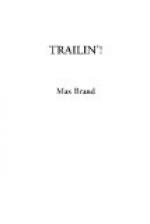There followed a bewildering exhibition of such bucking that the disgruntled cowboys forgot their shame and shouted with joy. Upon his hind legs and then down on his forefeet with a sickening heartbreaking jar the stallion rocked; now he bucked from side to side; now rose and whirled about like a dancer; now toppled to the ground and twisted again to his feet.
Still the rider clung. His head rocked with the ceaseless jars; the red-stained lips writhed back and showed the locked teeth. Yet, as if he scorned the struggles of the stallion, he brought into play the heavy quirt which had been handed him as he mounted. Over neck and shoulders and tender flanks he whirled the lash; it was not intelligence fighting brute strength, but one animal conquering another and rejoicing in the battle.
The horse responded, furiously he responded, but still the lash fell, and the bucking grew more cunning, perhaps, but less violent. Yet to the wildly cheering audience the fight seemed more dubious than ever. Then, in the very centre of the arena, the stallion stopped in the midst of a twisting course of bucking and stood with widely braced legs and fallen head. Strength was left in him, but the cunning, savage mind knew defeat.
Once more the quirt whirled in the air and fell with a resounding crack, but the stallion merely switched his tail and started forward at a clumsy stumbling trot. The thunder of the host was too hoarse for applause; they saw a victory and a defeat but what they had wanted was blood, and a death. They had had a promise and a taste; now they hungered for the reality.
Woodbury slipped from the saddle and gave the reins to Werther. Already a crowd was growing about them of the curious who had sprung over the barriers and swarmed across the arena to see the conqueror, for had he not vindicated unanswerably the strength of the East as compared with that of the West? Boys shouted shrilly; men shouldered each other to slap him on the back; but Werther merely held forth the handful of greenbacks. The conqueror braced himself against the saddle with a trembling hand and shook his head.
“Not for me,” he said, “I ought to pay you—ten times that much for the sport—compared to this polo is nothing.”
“Ah,” muttered those who overheard, “polo! That explains it!”
“Then take the horse,” said Werther, “because no one else could ride him.”
“And now any one can ride him, so I don’t want him,” answered Woodbury.
And Werther grinned. “You’re right, boy. I’ll give him to the iceman.”
The big grey man, William Drew, loomed over the heads of the little crowd, and they gave way before him as water divides under the prow of a ship; it was as if he cast a shadow which they feared before him.
“Help me through this mob,” said Woodbury to Werther, “and back to my box. Devil take it, my overcoat won’t cover that leg.”




